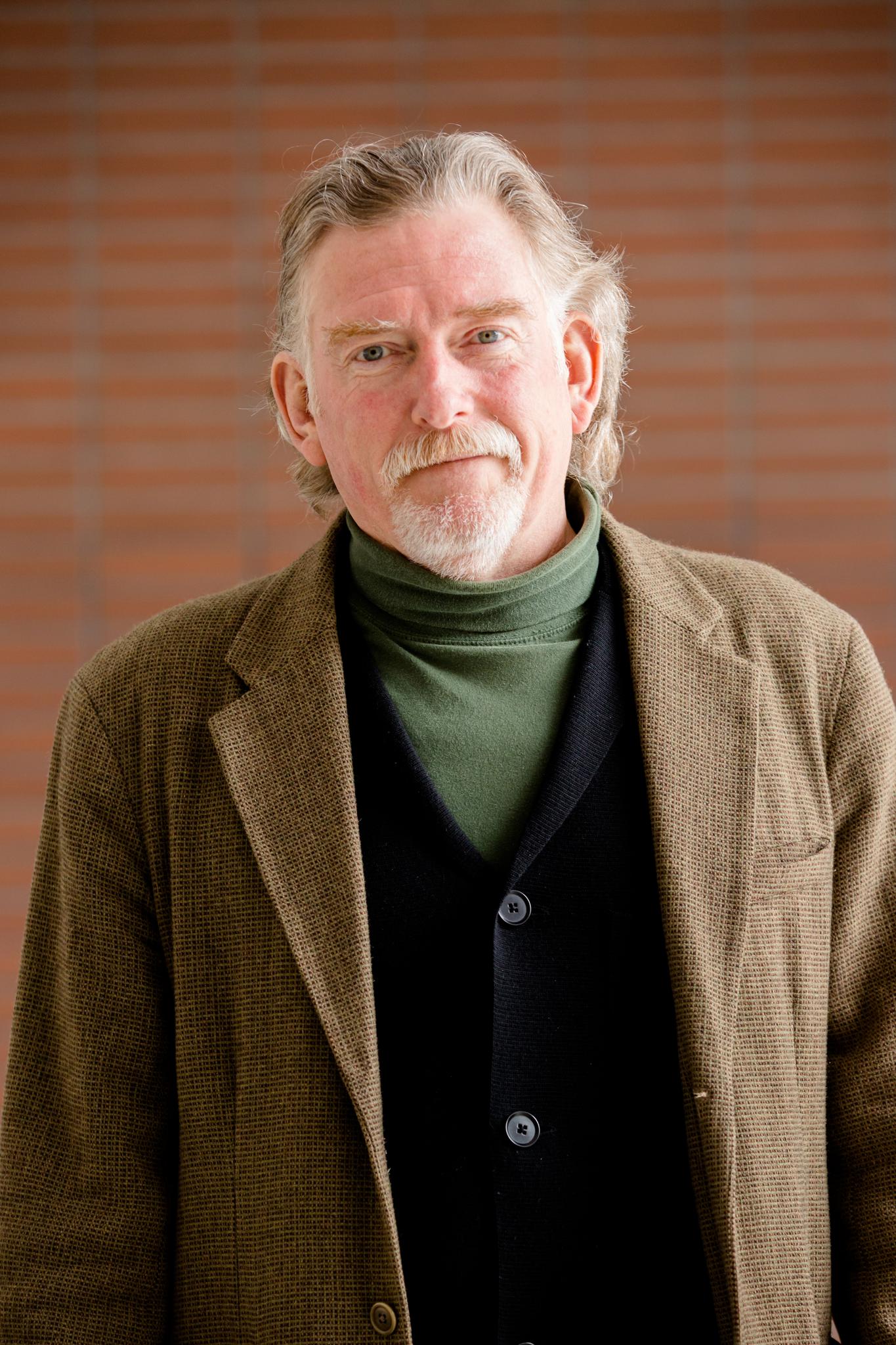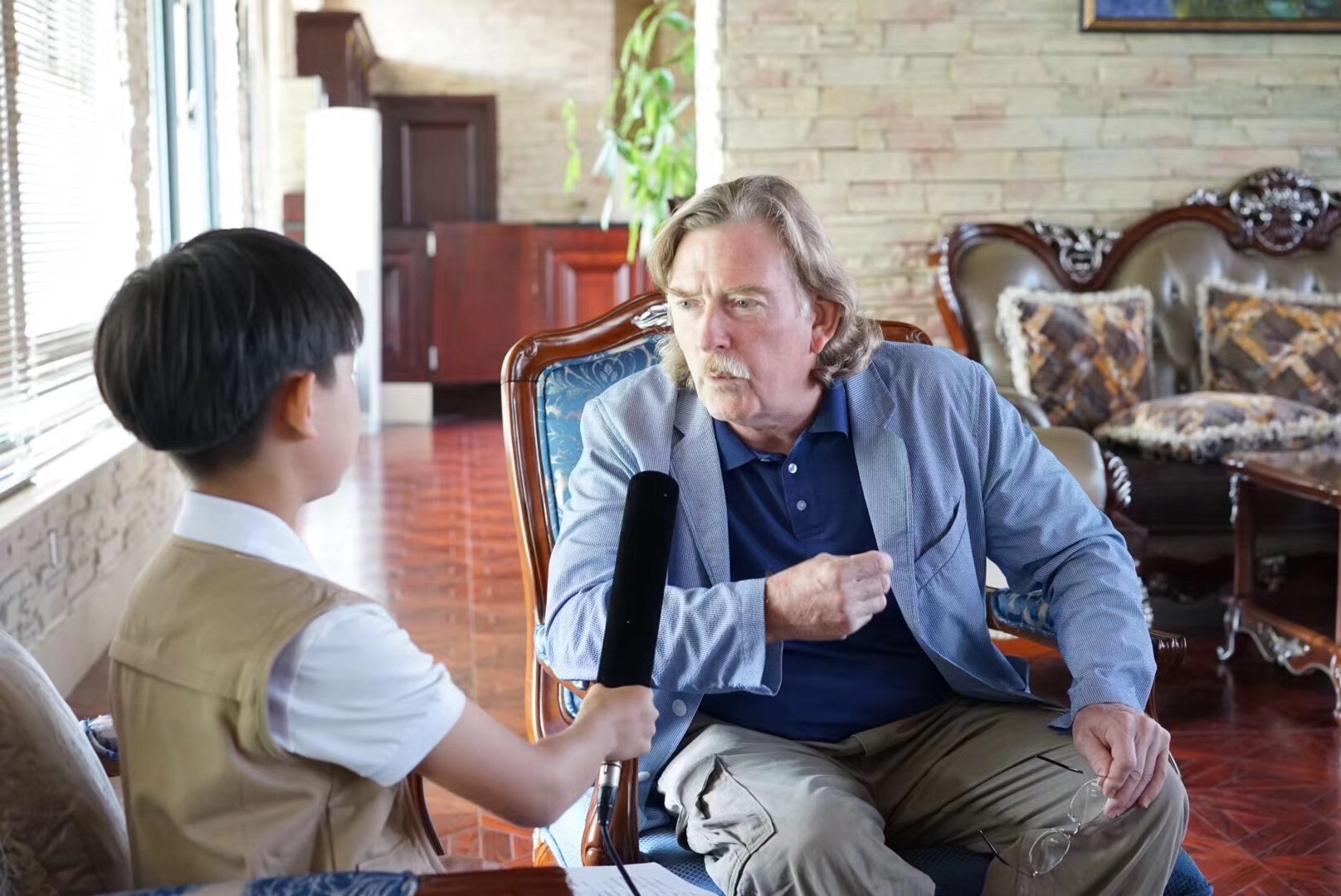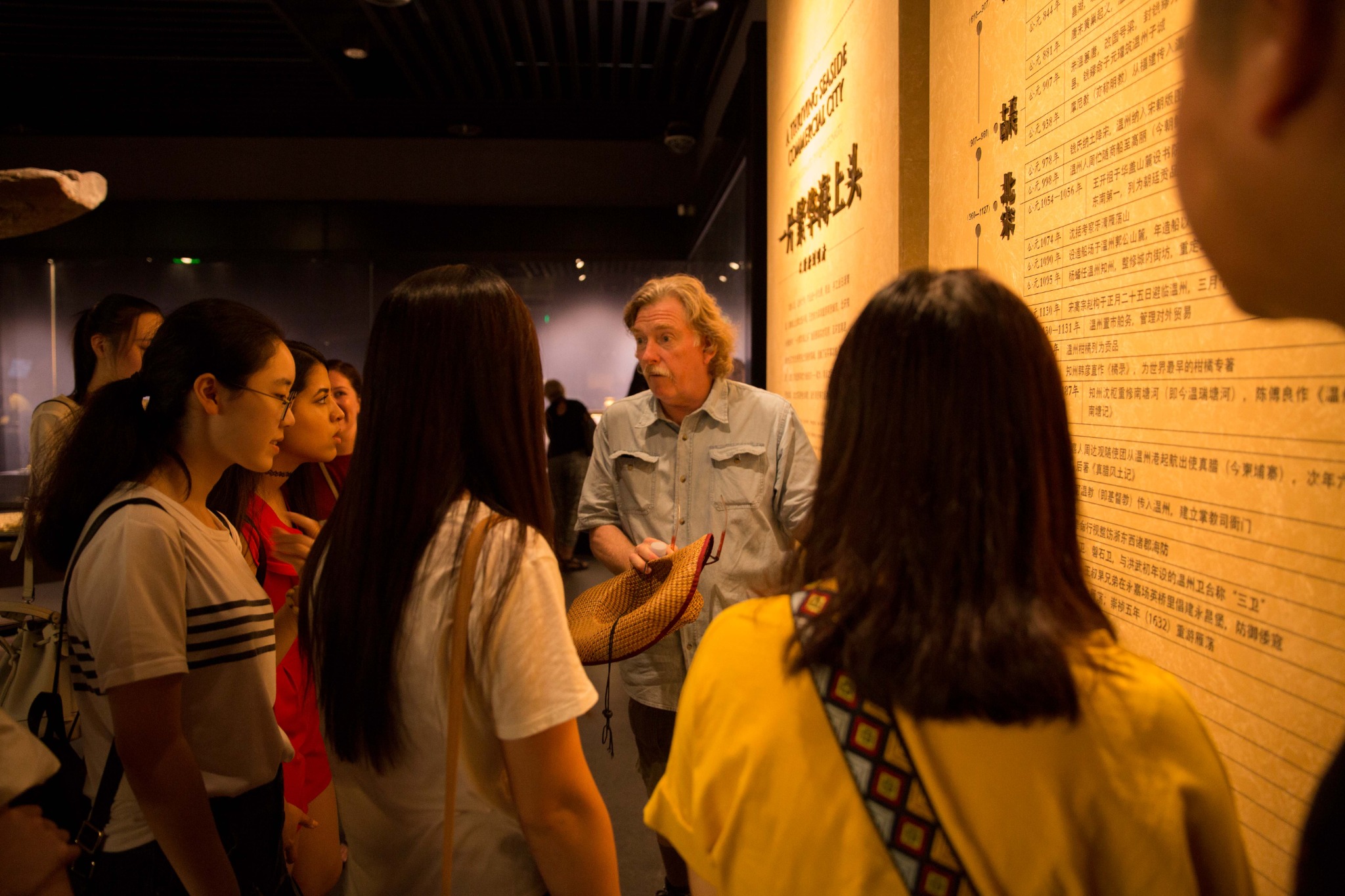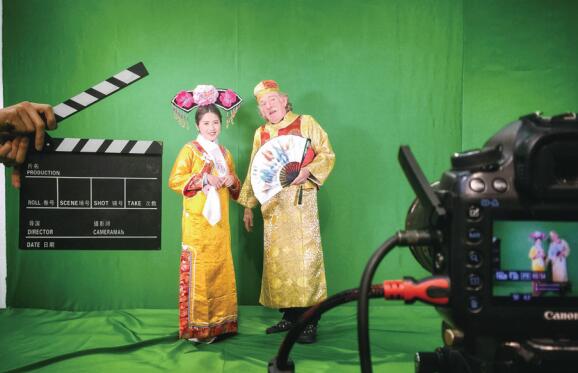PROFILE | “Promoting Sino-American Exchange is My Life-long Career”

David Purnell
If you have been following events like the Wenzhou International Cultural and Creative Industries Expo and Wenzhou Global Image Promotion Campaign, you may have frequently noticed a blond foreigner speaking fluent Beijing dialect on camera. He is David Purnell, Dean of the College of Liberal Arts at Wenzhou-Kean University.
After the Spring Festival in 2016, Dean Purnell sold his house in the United States and came to Wenzhou to live and work. However, Wenzhou is not Purnell’s first Chinese destination city; he had already visited China three times since the 1980s. For him, China has become his second home or even surpassed his hometown.
An American Youth in Love with Chinese Culture
Purnell was born into a Minister’s family in Pennsylvania. Like other American children, David grew up immersed in traditional American education. It was the East Asian culture course offered in high school that opened the door to Chinese culture for him.
In the 1960s, few people knew about East Asian culture in the United States. At an age of insatiable curiosity, Purnell was full of questions about eastern culture, which was only partially addressed by his teacher in class. “I still remember when our history teacher talked about Chinese Taoism in class, he explained that its core belief is doing nothing,” Purnell recalled. “I was baffled and thought that there was no way that Chinese culture was that simple.” To figure out what Chinese culture really was, Purnell set himself a small goal: learning the Chinese language.
At that time, Chinese language courses were not popular in the U.S. After high school, Purnell went to the University of Pittsburgh, which was one of the few American universities at that time that provided Chinese courses.
Despite his efforts to learn Chinese, David still found it difficult to communicate with others in Chinese with his one-sided knowledge. “Just go to a Chinese speaking country!” David decided. After learning Chinese for one year and a half, he got a chance to know from the embassy that a cargo ship was going to Taiwan. In 1972, he set off alone from Philadelphia and became the only passenger on that ship.
“The most attractive part is that I got to enjoy Chinese food for a whole month on board,” Purnell joked when speaking of this adventure in his early days. During his ten months in Taiwan, he found a paid position as an English teacher in Fu Jen Catholic University, while he busied himself exploring Taiwan Island, from Keelung, Taipei to the Amis aboriginal settlements. In retrospect, Purnell still misses the days living in the rentals of local people and talking with them from time to time.

David Purnell is taking an interview at Faculty and Staff Lounge at Wenzhou-Kean University
Three Times Return to China in Three Decades
After his trip to Taiwan, Purnell went back to the U.S. But when he enthusiastically told his family about the experience in Taiwan, his family reacted only perfunctorily and indifferently. Their attitude increased his desire to return to China.
In those days, there were no such instant communication tools as the Internet, Purnell then wrote many resumes by hand and asked the Educational Office of the Chinese Embassy in the U.S., his Chinese friends, and even his overseas Chinese students to help him send his resume to Chinese schools. “It was a painful time. I couldn’t do anything but ask for help and wait,” Purnell sighed.
After months of waiting, in 1985, David was finally employed as a teacher at Beijing International Studies University.
“It was a night when I arrived in Beijing, and it was all dark along the road. I was driven to the Friendship Hotel to settle in.” Since the reform and opening up in China was just initiated, what Purnell received was a “treatment of foreign guests”: the right to live in the pricey hotel and use foreign currency, though he did not care much for such special treatment.
To experience what local life was really like, he applied to move from the hotel to the teacher’s apartment. He dined out to eat hot pot with his colleagues, imitated their Beijing tone, and even tried to play mahjong. Purnell often attracted a crowd of curious spectators with his exotic blue eyes and blond hair when he walked along the streets. “It is quite easy to establish connections with people in China. Having a meal together and you all become friends, friends you can share everyday life trivia with, which is never the case in the U.S. Everyone here is friendly,” Purnell said.
Purnell changed his plan of staying one year in China, perhaps out of affection for China. Instead, he lived here for four years, during which he found his love and established a family.
Back in the United States, Purnell began to teach overseas students English in an American university. Until 2009, Central College, the place where he worked, and Zhejiang University, jointly initiated a summer camp program called “Bridge Program,” giving Purnell a second chance to set foot on China: as the head of the program. His responsibility was to lead American students to China and teach local children English. But as the program ended, he returned to the United States again.
Purnell never expected that it would take him seven years to return to China again.

Before the National Day in 2017, David Purnell organized foreign professors and exchange students from Wenzhou-Kean University School of Liberal Arts to visit the Wenzhou Museum
Sell the House and Depart for Wenzhou
Purnell chose to stay in the U.S. during his time with the Bridge Program because he wanted to be with his children while they grew up. Deep in his mind, he never gave up the thought of returning to China. In 2016, right after his children graduated from college, he began to implement his return plan.
By chance, he saw a recruitment announcement of Wenzhou-Kean University on the Internet. After searching for information about this university, he barely hesitated before sending his employment application.
This time, Purnell was more determined. After the Spring Festival in 2016, he sold his house in the U.S., rented a warehouse to store all his belongings, and left for Wenzhou alone.
When asked why he had selected Wenzhou to be his third residence in China, Purnell said that he found the local dialect very special when searching through the city profile, which was a huge attraction to him as a language researcher.
“I like to take a walk to places with rich cultural ambiance.” After class, he loves to stroll around the city. Apart from the vicinity of the university, Purnell also walks along historical streets such as Shuomen Street and Wuma Street, and experiences intangible historical heritage such as Ou kiln, Ou embroidery, and enthusiastically watched Nanxi opera that local young people barely care to learn about.
In less than two years, David Purnell has nearly known everything about Wenzhou, and his fluent Chinese allows him to be a frequent guest on local media.
On the opening ceremony of Wenzhou Culture and Creative Industries Expo in March of 2017, Purnell and Lou Minhui, a senior student in WKU, jointly recited a poem named An Ode to Yongjia, with Purnell reciting in Chinese and Lou in English, presenting a delightful contrast to the audience. In May, he played the part of a foreign journalist by the invitation of Wenzhou City News and discussed the construction and development of Wenzhou’s “City’s Study” with Hu Hairong, the curator of the City Library, and Jiang Shengnan, a famous writer.
Purnell said, “People say that Wenzhou is an economically developed city. When I walk through the streets and alleys here, I see that it is also a city rich in humanistic and historical ambiance.”

David Purnell (on the right) experiences the filming of a Qing Dynasty drama with students
More Wenzhou Culture to be Tapped
During the interview, Purnell emphasized more than once that Wenzhou is a city abundant in cultural stories that deserved to be disseminated and learned by more people.
Besides his own exploration, the ardent advocate of Wenzhou history and culture is also a vanguard in encouraging his foreign friends to walk into the long history and rich culture of the city.
The day before our interview, he accompanied his WKU colleges to travel to Yandang Mountain as a tour guide.
Ahead of the National Day holiday, Purnell organized foreign professors, exchange, and Chinese students to visit Wenzhou Museum, hoping they could further interact with this charming city.
In Chashan University Park, where Purnell lives, he has become an unofficial member of the neighborhood committee. As Halloween approached, people in the community invited him to mobilize other foreigners to celebrate Halloween here and organize people giving out candies and making pumpkin masks. On Winter Solstice, people would put red vest on him and invite him to give out Laba porridge, a traditional Chinese food and an initial taste of Chinese festival for this American.
“Many foreigners coming to Wenzhou only stroll around their residence and the places they work. They barely know a thing about other sites. Before long they would move to Shanghai, Beijing and other big cities because they think it is more ‘fun’ there. But in fact, Wenzhou also abounds in interesting places and activities which could be introduced to them.”
When asked which aspect of local culture did he plan to learn, Purnell seems excited. “The intangible historical heritage, ancient paper-making technique, movable-type printing...,” the list went on and on. Purnell was also thinking of making a list of Wenzhou’s history and culture museums to share with local foreigners.
“Promoting Sino-American exchange is a life career to me,” he said. There are still so many things for David Purnell to do.
